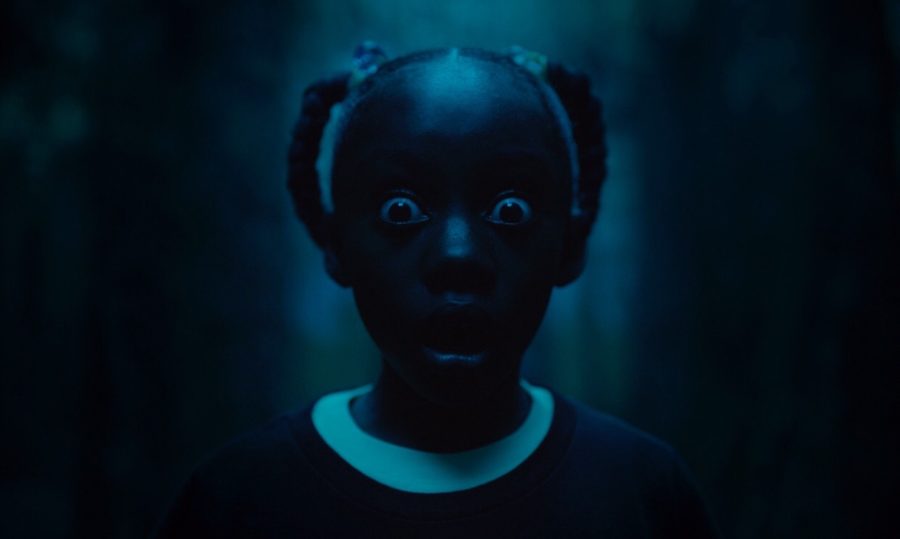In this film, we experience a sequence of events that follows a family trapped in a panorama of horror. They find themselves in a paradigm of glamour and laminated trauma within a modern-day black family’s household. The family finds themselves haunted as they fight and scrape their way away from their biggest fear- Us.
This past week, people rushed to the box office to see the movie, Us. On its opening night, it set an opening world record for an original horror movie. Jordan Peele, the director of the film, described the creation of Us as an attempt to exceed his success for his first film, Get Out, which released in 2017. Both films have lingering similarities.
The film takes place in modern day America, centered around an upper/middle-class black family. The father, played by Winston Duke, was a graduate from the prestigious HBCU (historically black college university), Howard University. Lupita Nyong’o played the mother, Adeleine Wilson who experienced PTSD from a traumatic event from her childhood. Her trauma was distilled in her as a child when she met her doppelgangers at a beach in Santa Cruz. The fear of this experience stayed in her throughout her years. To cope from that, her parents enrolled her into dance lessons. Shahadi Wright played Zora, a typical self-conscious teenager entangled to her phone. The son, Jason, played by Evan Alex, was closed off and precarious.
We follow the family as they make their way to their deceased grandmother’s home, that is coincidentally near the beach Adeleine saw her doppelgangers in Santa Cruz. When they make it to their destination, later that night, strange people break their way into their home greet them. They then realize they are being terrorized by their doppelgangers. Throughout the movie, we travel with the family as they fight their way through the terrifying night and gain revelation about what they’re capable of.
The reverse in gender roles adds to the originality of the storyline. The father did not act as the hero, hypermasculine or hypersexual partner in the film. Whenever he attempted to play hero, he injured himself. This is symbolism for the fact that men shouldn’t always be at the forefront of things and not everything is in their control. The wife played the stronger partner in their unconventional dynamic. She took the lead whenever she saw fit and listened to an internal fear that tugged her towards her doppelgangers.
External perfections encircle the film. Their doppelgangers are a reflection of everything they choose not to see about themselves- the dark and animalistic parts of them. It shows the barbarism that Americans all have within us. It reveals our willingness to accept and love things that feel familiar and patriotic, but exclude and disregard “foreign” people who look just like us.
The film does an amazing job at contorting and bending out of typical film household dynamics- a family with white or fair skin complexion, with a father who takes the lead at every turn.
Instead of pursuing the normal route, Peele illustrated trauma within black families. He accentuates their dark skin, putting certain filters and lights in the camera, allowing it to glisten. Their hair was put up in realistic hairstyles for black people- protective hairstyles and curly 4a textures. Through the celebration of black people, Peele revealed weaknesses that are held secret in the joints of family units.
Lupita Nyongo’s ability to flow in and out of both of her characters felt natural. It reflects the fluidity of her talent. Her animalistic approach to her roles took everyone into Adeleine’s world- a dark place shrouded with mystery and paranoia.
The film could’ve had a more substantial plot for the characters to follow. In Get Out, it feels as though Peele took his time to subtly reveal aspects of symbolism throughout the film. But with Us, he dropped Easter eggs and didn’t turn back to them. For people who might be unfamiliar with his agenda, they might only see the film in a surface way.
On the last scene, the song Le Fleurs by Minnie Ripperton rang throughout the theater- captivating us all to the screen. The film left everyone dumbfounded- still clung to our seats even after the end credits were finished rolling.
8/10: The movie lacked scary or thriller elements. This complex film shows his depth, but it might not be a great marketing tool for his next projects. Bravo to Peele for giving dark-skinned people platforms.
















